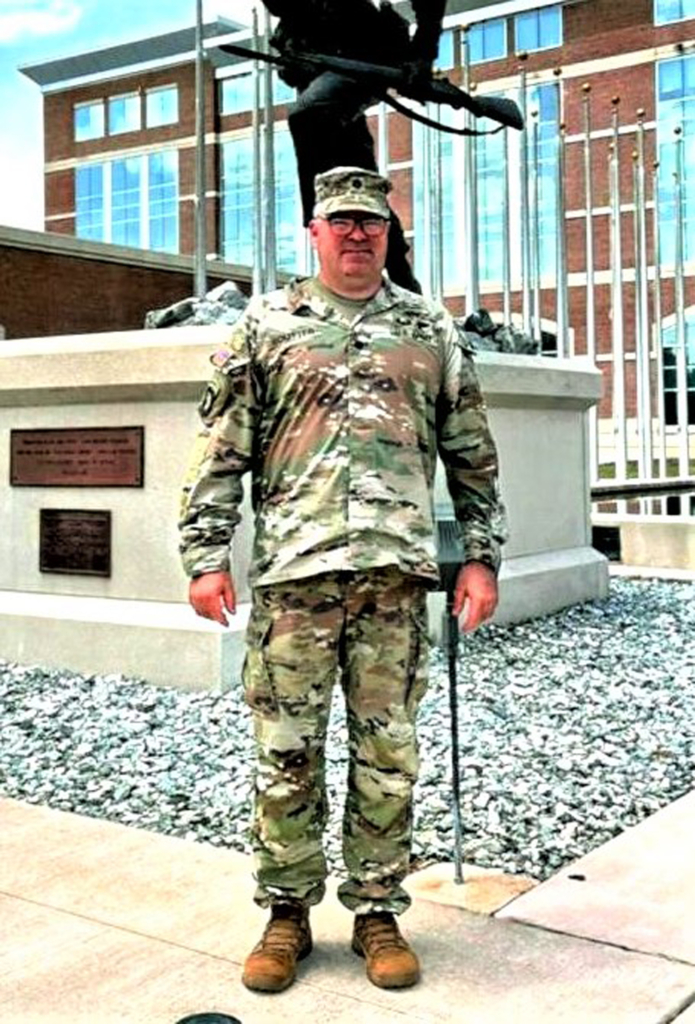Bozho (Hello),
In my efforts to keep our CPN veterans informed, I try to include topics and information that would be of interest to our readers. This includes health, both physical and mental, VA (Veterans Affairs) benefits and policies. I thought I might begin by including recognition of honorable CPN veterans who are still living. How better to begin to know our brothers and sisters-in-arms? I’ll begin by attaching a photo sent to me by a very proud mother of a U.S. Army soldier retiring at Fort Benning, Georgia, after 23 years of honorable service to his country and CPN Tribe, Lt. Col. Stacy R. Soutter. He has had multiple deployments to Iraq, Afghanistan and South Korea with additional assignments in South Korea, Hawaii, California, Texas, Kentucky and Georgia. He and his wife, Christy, have four daughters named Skylar, Sydney, Shae and Susie, and they live in Cleveland, Oklahoma. Migwetch, Colonel Soutter and family!

This is information that should be invaluable to everyone during this summer — ticks. Many of you know about ticks, but what you don’t know about them could be dangerous to your health. That goes for all ages.
1. Know what ticks look like. Learn which tick species live in your area and places you may travel. Blacklegged ticks and western blacklegged ticks spread Lyme disease.
2. Know where to expect ticks. Ticks live in grassy, brushy and wooded areas. Walk in the center of trails. I have had them drop from trees onto me in my own yard. Be aware.
3. Protect your body before going outdoors. Cover your skin and scalp by wearing a hat, long pants, long-sleeved shirts and socks. The Environmental Protection Agency recommends using insect repellent. Learn how to use it safely and effectively. When I was in the field in the Air Force Reserve, I used to put tick-and-flea collars on my boots. Warning: you can’t wear them touching your skin, but wearing them on your boots is safe. You can also sprinkle powdered sulfur in your socks and your underclothes. It’s very effective.
4. Check your body for ticks after being outdoors. Key parts of the body to check:
- Under the arms
- In and around your ears
- Inside the belly button
- Back of the knees
- In and around the hair
5. Learn the signs of and symptoms of Lyme disease. Seek medical attention if you show symptoms or have a tick bite. In most cases, a tick must be attached for 36 to 48 hours or more before the Lyme disease bacterium can be transmitted. Symptoms include:
Bullseye-shaped bite mark
- Fever
- Chills
- Headache
- Fatigue
- Muscle or joint aches
- Swollen lymph nodes
Be safe and enjoy your summer.
Remember, our monthly meeting of the Citizen Potawatomi Nation Veterans Organization is the 4th Tuesday of each month, August 22 (unless otherwise notified due to weather or conflicting events) at 6 p.m. (or as soon as you can get there) in the North Reunion Hall on the CPN Powwow Grounds. All CPN veterans and spouses and their families are welcome. Membership in the veterans organization is not required; come and visit us and enjoy our socializing. For more information, you can contact me.
Migwetch (Thank you),
Daryl Talbot, Commander
daryl.talbot75@outlook.com
405-275-1054
